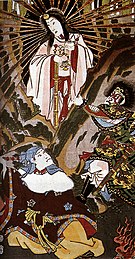mythical character From Wikipedia, the free encyclopedia
Hoori (also known as Hikohohodemi no Mikoto or Yamasachi-hiko) is a character in Japanese mythology. He is the third and youngest son of Ninigi-no-Mikoto and Konohanasakuya-hime, the blossom princess. Hoori is considered an ancestor of the Emperors of Japan and the grandfather of Emperor Jimmu.
| Hoori | |
|---|---|
 Hikohohodemi otokowa | |
| Personal information | |
| Consort | Toyotama-hime |
| Children | Ugayafukiaezu |
| Parents |
|
Hoori's story is told in ancient Japanese texts called the Kojiki and the Nihon Shoki. Hoori was a hunter who had an argument with his older brother Hoderi, a fisherman, over a fish-hook that Hoori had borrowed but lost. Hoderi insisted that Hoori return the exact same fish-hook, as each tool was believed to have its own unique spirit. To find the lost hook, Hoori went to the bottom of the sea where he met Toyotama-hime, the daughter of the sea god Ryūjin. With the sea god's help, Hoori found Hoderi's lost hook and eventually married Toyotama-hime.
Hoori and his wife lived in a palace beneath the sea for three years, but Hoori began to feel homesick and wanted to return to his own country. His brother forgave him after he returned the lost hook, and Toyotama-hime gave birth to their son, Ugayafukiaezu. However, during Toyotama-hime's childbirth, she made Hoori promise not to peek at her true form. But Hoori broke his promise and saw that she was actually a dragon, specifically a wani. Toyotama-hime was embarrassed and returned to her father, never to return. Ugayafukiaezu married Toyotama-hime's sister, Tamayori-hime, who raised him, and she gave birth to Emperor Jimmu, the first Emperor of Japan. Hoori ruled over Takachiho in Hyūga Province for 560 years.
Hoori is often linked to his parents and wife in Japanese mythology. He is primarily revered as a deity associated with cereals or grains. In Japanese mythology, it was believed that the "ho" part of his name meant fire, but it actually refers to crops, specifically rice, represented by a different character pronounced "ho" (穂). "Ori" (折り, to bend) signifies a bountiful crop that bends under its own weight. Another name for Hoori, Hohodemi, means "many harvests."
| Amaterasu | Takamimusubi | ||||||||||||||||||||||||||||||||||||||||||||||||||
| Ame-no-oshihomimi | Takuhadachiji-hime | Ōyamatsumi | |||||||||||||||||||||||||||||||||||||||||||||||||
| Ninigi-no-Mikoto (天孫) | Konohanasakuya-hime | Watatsumi | |||||||||||||||||||||||||||||||||||||||||||||||||
| Hoderi | Hosuseri (海幸彦) | Hoori (山幸彦) | Toyotama-hime | Utsushihikanasaku | Nurutama-no-mikoto | ||||||||||||||||||||||||||||||||||||||||||||||
| Hayato people | Ugayafukiaezu | Tamayori-hime | Azumi people | (Owari clan Yamato clan) | |||||||||||||||||||||||||||||||||||||||||||||||
| Itsuse | Inahi | Mikeiri | Jimmu | ||||||||||||||||||||||||||||||||||||||||||||||||
| Imperial House of Japan | |||||||||||||||||||||||||||||||||||||||||||||||||||
 |
|
|
Mythic Texts and Folktales:
|
Seamless Wikipedia browsing. On steroids.
Every time you click a link to Wikipedia, Wiktionary or Wikiquote in your browser's search results, it will show the modern Wikiwand interface.
Wikiwand extension is a five stars, simple, with minimum permission required to keep your browsing private, safe and transparent.